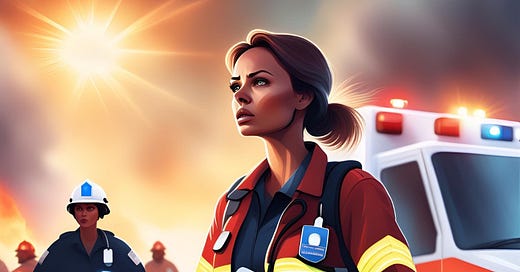When you show up on scene, the first thing you do is assess.
You gather info.
Vitals. Context. What happened.
Who’s involved. How long they’ve been down.
What you’re walking into.
That’s data.
And you collect it because it helps you do your job better.
Faster. Safer. Smarter.
Without it, you’re guessing.
And in our world, guessing can get someone killed.
So here’s the question:
Why do so many of us stop collecting data when it comes to our own lives?
We wait until we’re burned out, injured, or running on fumes before we notice something’s wrong.
By then, the damage is done.
But it doesn’t have to be that way.
Data isn’t just for trauma scenes. It’s a self-rescue tool.
And no—this isn’t me telling you to track every calorie or download another app.
I’m not here for over-optimization or spreadsheet obsession.
That’s just another flavor of control.
What I am here for?
Useful patterns. Small signals. Clarity.
What makes you feel better?
What consistently wrecks your sleep?
When do you actually feel like yourself?
Start noticing.
That’s data.
The women I work with don’t need more hustle or more goals.
They need space to see what’s actually going on.
Because let’s be real:
Most burnout isn’t mysterious.
It’s cumulative stress + no exit strategy.
And the signs are there long before the crash.
But if you’re not paying attention, you’ll miss them—just like bad intel on a high-stakes call.
Track less to obsess, more to adjust.
Pick one thing.
Sleep.
Mood.
Energy after shift.
What you're reaching for when stress spikes.
You’re not judging it. You’re just collecting clues.
Because just like on the job:
Better information = better decisions.
That’s it.
If you want a simple place to start, pick 4 aspects of your life.
No fancy tech. No rigid rules.
Just four core pillars to track:
→ Sleep
→ Movement
→ Fuel
→ Focus
If they’re off, you’re off.
If they’re dialed in, you’ve got bandwidth to deal with the rest.
You don’t need perfect data.
You need relevant data.
And the courage to act on it.
So you can stop reacting to life like a crisis—
and start leading it like a mission.
Because that’s what you were built for.




